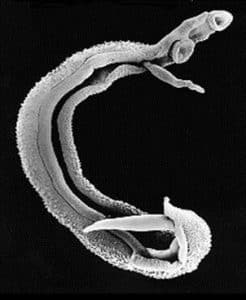NEWS RELEASE
Scientists receive $3.5 million from NIH to study drug resistance in a global parasitic disease
Study aims to identify the mutations involved in drug resistance in schistosome parasites

SAN ANTONIO (June 7, 2016) – Schistosomiasis, a disease caused by parasitic flukes that live in the blood vessels, affects more than 200 million people in Africa, Asia, South America and the Middle East, and ranks second only to malaria as the most devastating parasitic disease of humans, according to the Centers for Disease Control. Dr. Tim Anderson in the Department of Genetics at Texas Biomedical Research Institute and Dr. Phil LoVerde at the University of Texas Health Science Center at San Antonio have been awarded a $3.5 million grant over the next five years by the National Institutes of Health to understand the genetic changes in the parasite that lead to drug resistance. Chronic schistosomiasis infection can lead to liver failure and bladder cancer, and, in 240 thousand people annually, infection can lead to death.
Praziquantel (PZQ) is the primary drug to treat schistosomiasis, and 250 million doses of this drug are now used to treat patients every year. With such intensive drug treatment the public health community is concerned that resistance to this drug will emerge – or may have already emerged. The way in which the drug kills parasites is also not known. PZQ targets adult parasites, and it is unknown why the drug is ineffective against immature stages.
“We currently don’t know how the drug works and what the mechanism of action is,” Anderson explained. “Once we know how the drug works, we can start to improve it. One way to understand how the drug works is to identify the genes that make parasites resistant.”
Like bacteria and viruses, parasites can adapt rapidly to drug treatment. In a prior study led by Anderson and LoVerde, genetic crosses between sensitive and resistant parasites identified a single region of the parasite genome that is strongly linked to PZQ resistance. The research funded by this grant will focus on the precise genes and mutations that are involved in the resistance in this laboratory genetic cross. Researchers will then determine whether the same genes are involved in PZQ resistance in schistosome parasites infecting people in Kenya and Uganda.
“We can obtain parasite eggs from fecal samples collected from patients, hatch parasite larvae, and sequence their genomes,” Anderson explained. “We can then examine the same patients after PZQ treatment. A proportion of these patients will still be infected: we can identify the genes involved in resistance by sequencing the parasites that survive drug treatment.”
Identification of the genes involved in resistance would allow development of simple molecular tests to monitor resistance during parasite treatment programs. Such “molecular markers” are now used for monitoring resistance in malaria control programs and would be an immensely valuable tool for providing early warning of drug resistance emergence in Schistosomiasis.
In addition to collaborating with Dr. Phil LoVerde at the University of Texas Health Science Center at San Antonio, Texas Biomedical Research Institute is working with field researchers in Uganda and Kenya. This grant funding further builds a vigorous research program on viral and parasitic diseases at Texas Biomed.
###
Texas Biomed is one of the world’s leading independent biomedical research institutions dedicated to advancing health worldwide through innovative biomedical research. Texas Biomed partners with hundreds of researchers and institutions around the world to develop vaccines and therapeutics against viral pathogens causing AIDS, hepatitis, herpes, hemorrhagic fevers and parasitic diseases responsible for malaria and schistosomiasis. The Institute also has programs in the genomics of cardiovascular disease, diabetes, obesity, psychiatric disorders and other diseases. For more information on Texas Biomed, go to www.TxBiomed.org.
Related News
Dr. Tim Anderson discusses his work with parasitic diseases at Texas Biomed.